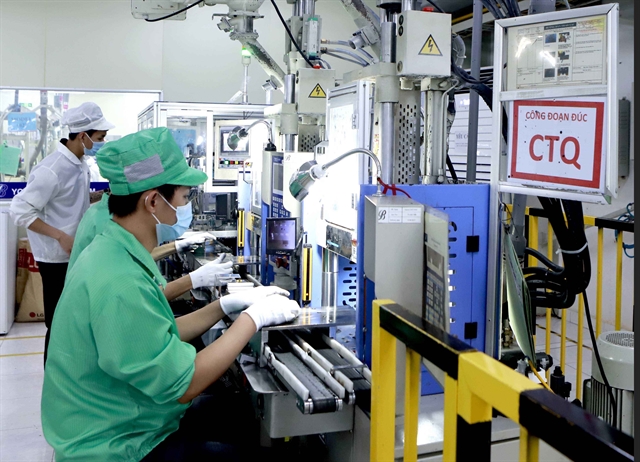 Economy
Economy


|
| Production at Youngbag Việt Nam in Vĩnh Phúc Province's Bình Xuyên Industrial Zone. Tax collection in the first seven months of this year set a record high but has slowed since the fourth outbreak began in late April. — VNA/VNS Photo Hoàng Hùng |
HÀ NỘI — Tax collection in the first seven months of this year set a record high, driven by robust banking, property, securities and automobile production sectors, but was slowing down as the virus took a toll, according to the General Department of Taxation.
Statistics showed that tax collection was estimated to total VNĐ763.8 trillion from January to July, equivalent to 68.4 per cent of expectations for the full year and increasing by 13.1 per cent against the same period last year, setting a record high in terms of collection value.
The General Department of Taxation said that tax collection in the period was good mainly thanks to the recovery of the economy in the final months of 2020 and the increases in tax collection from robust sectors, including banking, real estate, securities and automobile production.
Tax collection from the banking sector increased by 72.9 per cent, the equivalent to VNĐ6 trillion on good credit growth, increases in banking services fees and a reduction in operating costs which helped increase banks’ profits.
The real estate market also recovered in late 2020 and early 2021 with a number of projects transferred which pushed tax collection up by 61.7 per cent to VNĐ25 trillion. The increase in merger and acquisition deals in the early months of 2021 also pushed up corporate income tax collection by 2.6 times to VNĐ5.7 trillion.
The tax collection from the securities sector rose by 2.47 times to more than VĐ5 trillion in January – July.
Policies to promote the consumption of domestically produced and assembled cars also helped increase tax collection by 47.1 per cent, the equivalent to VNĐ35 trillion.
However, the General Department of Taxation said that tax collection was on a decreasing trend month over month with higher decreases since the fourth outbreak of the virus in late April.
Statistics showed that domestic tax collection increased by 15.9 per cent in April but slowed down to 5.6 per cent in June and even dropped by 10.4 per cent in July.
Tax debts also increased by 23 per cent against the end of 2020 to more than VNĐ116.8 trillion, reflecting that production and business were struggling in the COVID-19 pandemic.
The tax watchdog said that while the economy was still facing challenges as the pandemic remained complicated in a number of provinces and cities, including HCM City, Đồng Nai, Bình Dương, Long An and Bà Rịa – Vũng Tàu, focus would be placed on removing barriers and making it easier for enterprises to maintain their production and business and attract investment, which would help increase tax revenue in the long term.
The tax watchdog is also focused on implementing tax and fee exemptions, reductions and extensions for enterprises and citizens following the Government’s directives to promote production and business and well as economic growth.
Special attention would be attached to enhancing tax management of e-commerce and businesses on digital platforms such as Facebook, Google, Youtube and Netflix.
More support
At the meeting on Thursday, the Government basically agreed with the Ministry of Finance’s proposal about a tax and fee reduction and exemption package to support citizens and enterprises affected by the COVID-19 pandemic.
The package included a 30 per cent reduction in corporate income tax for those with revenue of less than VNĐ200 billion per year, a 50 per cent reduction in the third and fourth quarters of all household and individual businesses, together with a 30 per cent reduction in value-added tax for some sectors.
The ministry also proposed exemption of the fee for late payments arising in 2020 and 2021 for enterprises and organisations which incurred losses for the three consecutive years of 2018, 2019 and 2020.— VNS




